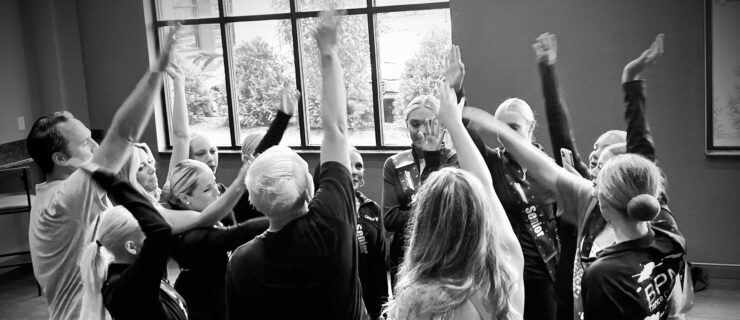How to Be a Fair and Constructive Competition Judge
Judging dance competitions demands a unique blend of skills, from articulating useful corrections on the fly to staying focused for hours at a time. With just a few minutes to see and score each routine, it’s easy to feel overwhelmed by everything you may want to say—or, worse, to have nothing to say at all. Here’s how to stay organized, alert, and constructive during long judging days.
Get on Their Level
When issuing critiques, keep your audience in mind. In today’s competition world, judges are almost always talking directly to dancers, rather than to teachers or choreographers. During the first few moments of a routine, seasoned judge Courtney Ortiz, owner of Impact Dance Adjudicators and host of the dance competition podcast Making The Impact, carefully observes the dancer’s age and ability level. “If there’s a recreational dancer in the mini category onstage, we have to be using language that a 6-year-old is going to understand, just like you would in a classroom,” she explains.
Ramita Ravi, a co-founder of freelance gig platform Artswrk, who has judged at multiple competitions, waits to layer on more nuanced corrections until dancers have a strong technical foundation. “Then, I can focus on aspects like dynamics and storytelling,” she says.
Don’t Be Distracted
When commenting and scoring, both Ravi and Ortiz try to stay neutral about anything the dancer can’t control. “I notice the costumes, music choices, and choreography, but I don’t usually add or subtract points as a result,” Ravi explains. However, if anything comes across as inappropriate, or if they have a choreography tweak that could improve the dancer’s score, both judges have sometimes included feedback at the end of their critiques—with a disclaimer that only the teacher should listen in.
Keep It Consistent
According to Ortiz, scoring is often the hardest part of judging, because different competitions have such different scoring systems. Ravi always writes the point ranges for each award bracket in her program, as well as what she scores each routine. “That way, I know what score I have to give to award someone a certain medal, and I can compare routines in the same category even if they don’t perform back to back,” she says.
Whether you’re a new judge or just new to a competition, it’s best to ask what the event prefers in terms of minimum scores, for example, or using whole numbers versus decimals. You can even request an example of a recent routine and the score it received beforehand to help you get a sense of the system.
But often the best guidance for scoring is, once again, to consider who you’re judging. “If competitions want to use the full spectrum of awards they offer, then judges need to score based on who showed up that day, even if they have a different expectation for what their top adjudicated score is,” says Ortiz.
Play the Long Game
A judging gig is like a marathon—or, more aptly, three marathons in one weekend. “Try to eat properly and get a good night’s sleep,” Ravi says.
Ortiz urges judges to be candid about what they need to do their jobs effectively. “As soon as you arrive, scan through the schedule and see if there are breaks built in,” she says. “If there aren’t, ask the director how you can signal for one if you need it.”
Judging may be a demanding side hustle, but it’s equally rewarding. “I’m so energized by people’s passion and talent,” Ravi says. “There are dancers I met in my early days judging who I now work alongside professionally, and I love connecting with new people in our industry every comp weekend.”
How to Make the Panel
Hoping to kickstart your judging career? Ramita Ravi began hers by reaching out to competitions she had attended growing up and highlighting her teaching experience. If you’re just starting out, Courtney Ortiz recommends listing all of the styles, ages, and levels you’ve taught on your resumé, in addition to your education, any certifications, and performing jobs. “If you specialize in a specific style, definitely note that, but also aim to show your versatility,” she says.
And don’t underestimate the power of a good review—from peers, or even from the studios you’re judging. Performer and dance teacher Jackson Siegel, who uses he/they pronouns, was hired for their first judging gig after getting a referral from a friend. Then, “once competition directors heard positive feedback on my critiques from studios, I was hired more regularly,” says Siegel.




